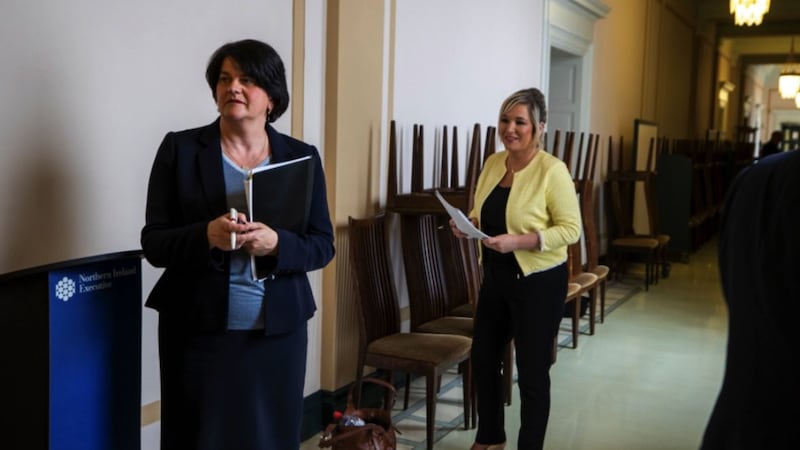During the three years the assembly was in suspended animation (although it tended not to be all that animated during the previous decade) I wrote a number of columns for the Irish News setting out the sort of overhaul required before it was restored.
The overhaul should take note of lessons to be learned from the RHI inquiry; further lessons to be learned from the three executives between 2007-16 (when, let's not forget, there were a series of crises, stand-offs and emergency summits); and then build-in measures to ensure that earlier mistakes would not be repeated.
I may as well have whistled the Sash and tap-danced my way along the Falls Road with Arlene and Michelle. When the assembly returned in January - primarily because neither the DUP and Sinn Féin wanted another election - the parties hadn't resolved anything. The ability of one of them to block decisions or bring down the structures was agreed by both during the St Andrews negotiations and signed-up to when they finally created their 'ourselves alone' arrangement in May 2007. Indeed, they sold it to their grassroots and broader bases within their own communities as the best way of stifling the ambitions and agenda of the other.
The DUP may have a point when it says that Sinn Féin tends to do most of the blocking: but Sinn Féin is only able to do it because the DUP made provision for it while claiming to be negotiating a 'fairer, better agreement' in the run-up to 2007.
And the DUP returned to the executive five months ago fully aware that the devices which had allowed Sinn Féin to bring down the assembly in January 2017; and the devices which allowed the party to block the signing-off of policy any time it chose, remained in place.
On Wednesday morning, responding to the newest stand-off between the parties, I tweeted: 'The latest problem bedevilling the DUP/SF over free school meals and victims pensions is yet another example of what happens when you have a quid pro quo form of government rather than genuine power sharing. It is what it is, because a majority of voters vote for it.'
Within a couple of minutes I was being told that I shouldn't be blaming the DUP because the problem was rooted in Sinn Féin's blocking strategy. I was also told by Sinn Féin supporters that it was the DUP's fault because it had reneged on what was a supposed understanding on pensions.
But it is a joint problem. You can't just blame one party when both parties agreed to - and haven't since rewritten or dumped - a device which allows them to block something if they want to. Worse, the DUP had three years to rethink and rewrite it and then include it in both sets of negotiations to restore the assembly. It didn't do any of that. Not only did it do nothing, it also ignored the warnings of those who argued that returning to the same-old, same-old executive structures would simply guarantee the return of the same-old, same-old crises. Like now.
The most accurate response to my tweet came from AndyLindsayBelfast: 'It doesn't matter what system of government we have. If the second biggest party doesn't want it to function, it won't.' He could have added that the same goes for the biggest party; or that the blocking actions of just one of those parties can overrule the votes of every other party in the executive and the votes of every other MLA in the assembly chamber. It was a problem noted by a number of observers in May 2007; yet despite the crises and stand-offs over the next decade (and complaints, at various times, from both the DUP and Sinn Féin), the problem remains.
The bigger problem, of course, is that neither party wants genuine power sharing. Quid pro quo suits them very nicely, allowing them to up the ante at the merest whiff of an election. Maybe it has something to do with the fact that both acknowledge 'it's all about the numbers now' and will continue to be, so what's the point in focusing on consensus and reconciliation? Anyway, Sinn Féin has no particular interest in an assembly which highlights a dual jurisdiction it wants toppled and, consequently, no interest in finding a replacement for a blocking device which suits it very nicely.
A 'resolution' will be found for this crisis, but you can bet your bottom dollar no resolution will be found to what caused the crisis in the first place.








